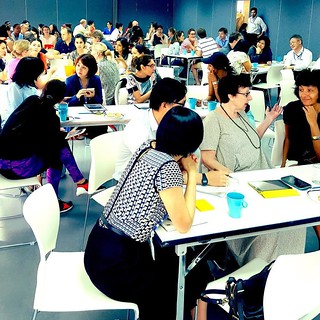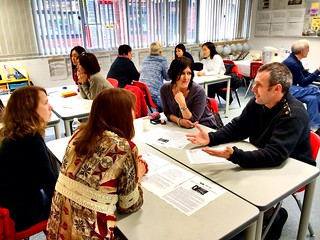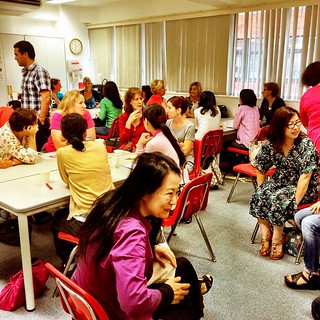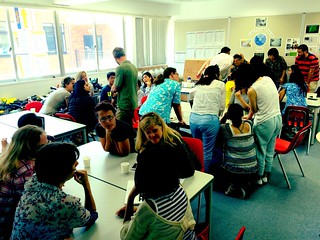One of my roles as Consultant-in-Residence at NIST is to offer workshops for parents about technology and learning. Having done the same thing at both ISB and YIS for the last eight years, this is something I know parents appreciate, and really helps support the type of teaching and learning we want to happen at school by giving parents a deeper understanding of why we do what we do.
 When I’m full-time employed by a school, I usually run these sessions every month, and mix and match the concepts based on what parents are interested in, what’s going on at the school, what’s making headlines, and what I think parents should know (you can see all the sessions we ran at YIS here). However, as a consultant, instead of regular sessions throughout the year, because my schedule changes so much, we developed a four-session, mini-course for parents. The dates were set in advance, and parents signed up for the whole set of four.
When I’m full-time employed by a school, I usually run these sessions every month, and mix and match the concepts based on what parents are interested in, what’s going on at the school, what’s making headlines, and what I think parents should know (you can see all the sessions we ran at YIS here). However, as a consultant, instead of regular sessions throughout the year, because my schedule changes so much, we developed a four-session, mini-course for parents. The dates were set in advance, and parents signed up for the whole set of four.
Although I love the freedom to develop and change ideas throughout the year (especially when I was working with my superstar YIS colleagues, Adam and Clint), I’m realizing that I also really like the 4-session set. It’s great for parents to know what’s coming and when, and to be able to build upon the previous sessions because I know everyone attended. Luckily, I get to work with Tosca on these sessions, so I have another great partner with insight into the parent community here in Bangkok.
Here is the description for the course, the title of each one links to the resource pages (including the actual presentation used) for that session:
Parenting in a Digital World
This 4-session mini-course for parents will highlight the changes in today’s learning landscape. Together, we will explore the ways that we are learning and sharing with technology – both within the school setting, as well as in the wider world, and what this means for parents. The course will run from 3 December – 17 March.
Each session will include discussion-rich activities to structure our conversations and model the way that students are learning here at NIST. We will be prompted by media, articles and resources that prompt an open and honest dialogue about learning in a technology-rich world. Resources from the course will be available online for further research and reflection throughout the course (and beyond). Parents of children in all age ranges are welcome to attend.
The course will include four sessions in total:
Parenting in a Digital World: An introduction to the ways that students are learning in the digital world, how parents can engage and support their children in this environment, and what this means for decision making at home. We will explore research from MIT, as well as key highlights from the big thinkers in 21st century learning, to discover how and why learning may look differently today than it did when we were in school.
Living with Laptops: Managing Devices: We know that developing strategies for maintaining a healthy, balanced lifestyle in technology-rich school is a key priority for many families. We all struggle to manage our many devices, from mobiles, to laptops, to kindles, to iPods, and everything that comes next. During this session we will share ideas and strategies to help your family build and maintain a healthy and well-balanced lifestyle based on current research, experiences last year and suggestions from families at a variety of international schools.
Understanding Digital Citizenship: In addition to the technology skills that student learn, it is also critical to focus on the “other” side of technology use: behavior, responsibility, and safety. These general skills are referred to as Digital Citizenship. This session will be an introduction to most important concepts in Digital Citizenship, as well as the ways that schools, including NIST, are helping students learn these critical skills and understandings.
Embracing Creativity: Looking Beyond the Tools: Although technology is great for being productive, we also highlight the use of technology tools to promote creativity, collaboration and communication. This session will feature new creative uses of technology along with ideas for how to support your child’s creativity at home.
Key Elements
I’ve run a lot of these sessions over the years, and there are a few things I’ve learned that can help them run more smoothly:
Parents enjoy workshops too!
One of the interesting things about running sessions for parents, as compared to teachers, is that they’re not always expecting to be actively engaged.  They get presented to a lot, so when you ask them to stand up or collaborate, or move around the room, it can be surprising. But, just like teachers, it’s clear they appreciate the opportunity to engage with the content rather than just hear about it.
They get presented to a lot, so when you ask them to stand up or collaborate, or move around the room, it can be surprising. But, just like teachers, it’s clear they appreciate the opportunity to engage with the content rather than just hear about it.
So, for each session, I always try to make sure there’s a bit of a warm up at the beginning, some kind of hands on activity (or two or three) in the middle, and a reflective wrap-up at the end. Not only is this great for them and their learning, but it gives them a bit of an insight into how we train our teachers, and how we work with students too.
Share your resources
I know teachers appreciate it when you share your resources, but I almost feel like parents appreciate it even more. Often they’re not really sure where to look for helpful advice, so having access to a selection provided by the facilitator is a big deal. Especially because they are not constantly engaged in professional learning, like teachers often are, this is a very valuable learning opportunity.
Personally, I like to share everything – the slideshow I use, the websites I reference, and I often include a summary of the key highlights from our conversation, but whatever works for you will surely be appreciated!
Under-plan
 This may be advice to myself, but I tend to always over-plan everything, and I often think about the big ideas the way I would present to teachers, which assumes a bit of background knowledge that parents may not have. When I know the parents well, I prefer to almost actively try to under-plan the sessions (which is very hard for me).
This may be advice to myself, but I tend to always over-plan everything, and I often think about the big ideas the way I would present to teachers, which assumes a bit of background knowledge that parents may not have. When I know the parents well, I prefer to almost actively try to under-plan the sessions (which is very hard for me).
I like to start with an interesting resource, like a video or a reading, and then let the conversation flow from there. If you are all comfortable in the room together, you will discover lots of interesting topics and questions that you may not have time for if you planned out every minute!
Be prepared
Along the same lines, especially when you under-plan, you need to be prepared for those unexpected (or very expected) questions. I find it fascinating that, over the years, I hear the same exact questions almost every session. Very often it’s from the same parents each time. Sometimes I think they are hoping for a different answer, or maybe they don’t remember the conversation from last time, I’m not sure.
What can be challenging though, is if you have a parent with a very specific agenda, who is attending in order to share a message. In that case, you need to be well-prepared with a quick segue or statements that can bring that conversation to a halt (for a private follow up) so that it doesn’t de-rail the entire session.
Be Clear and Concise
Many parents struggle with similar issues: helping children manage time on devices, finding balance, helping their children get organized, most likely you know what they are. The challenge with these issues is that they are not cut and dry, the same process that works for one family may not work for another. And, perhaps a bigger challenge, is that these questions are usually not just about the device, they’re usually about parenting choices, or family values, or parent-child relationships. So, in a word, complex.
The challenge with these issues is that they are not cut and dry, the same process that works for one family may not work for another. And, perhaps a bigger challenge, is that these questions are usually not just about the device, they’re usually about parenting choices, or family values, or parent-child relationships. So, in a word, complex.
This doesn’t mean we have time to talk through all the elements in front of everyone, but we can be very clear in our generic recommendations (not using teacher language) for parents, including ideas like:
- having open and honest conversations with their child and their use of technology
- developing a relationship of trust around the use of technology
- trusting themselves that they have the skills to deal with digital versions of growing pains
- learning with (and from) their children about new tools, apps and devices
- modeling the behavior they would like to see from their children
- communicating and coming to an agreement with their children about their use of technology
Bring in students!
If you have the opportunity, have students join your sessions – or at least a few of them. We’ve run trainings where students teach parents how to use Minecraft, or older students have been on a panel to share their advice about growing up with so much technology. It’s always fun to see students give parents the same answers you would. It’s not only great for the parents, but the students (of course) love being the experts too!
Final Thoughts
I remember the first workshop I did for parents. It was kind of a disaster – one parent derailed the entire conversation, I lost the flow of what I was trying to focus on, and I never saw that parent again. But, I think I’ve learned a lot over the years, and these sessions have become some of my favorites. Very often parents are just looking for guidance, and even if you don’t feel like an expert, you have so much to share. Being a teacher, you have worked with far more children going through the same challenges than each individual parent will ever meet. You’ve had the opportunity to see the way different approaches have worked with different families, and this alone is super helpful.
Do you run parent training sessions at your school? What advice would you share? What are hot topics of conversation with your parents? What works best with your school community?
Image Credits
- In action at a parent coffee morning at NIST, photo by Brian Duffy, used with permission, Creative Commons Licensed by Kim Cofino on Flickr
- Great conversations at our parent coffee morning at NIST, photo by Brian Duffy, used with permission, Creative Commons Licensed by Kim Cofino on Flickr
- Active discussions in today’s parent tech coffee morning, by Kim Cofino, Creative Commons Licensed on Flickr
- Turns out 11am is a very popular time for parent tech coffee mornings! by Kim Cofino, Creative Commons Licensed on Flickr
- Today’s parent tech coffee morning is packed! Topic: #minecraft explained by students, by Kim Cofino, Creative Commons Licensed on Flickr






Great article – so many wonderful points!